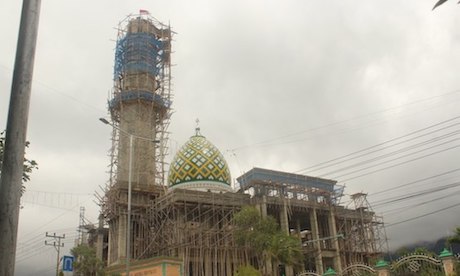Father Konstantinus Bahang says the attitude of Christians towards Islam of late has displayed both fear and, increasingly, loathing.
He says their fear stems from growing Islamisation in all spheres of life, particularly the economy.
“Most of the people who are well-connected and who are prospering are Muslims, while Papuans are getting left out,” said Bahang, a lecturer at the Fajar Timur College of Philosophy of Theology in Jayapura.
Islam symbols are becoming more commonplace in public spaces, he said.
“These are public service spaces for Christians and Muslims alike, but now Muslims control them.”
Jayapura city has over 80 mosques and mushollas (mosque-like prayer rooms) built in or near local markets, residential areas and government offices.
The neighbouring district of Sentani has 24 mosques while Jayapura District has 52.
Papua has a population of about 3.6 million people, 61.3 percent of whom are Protestants, 21 percent Catholics and 17.4 percent Muslims.
From the perspective of religious psychology, this growing Islamisation can be seen as a bid to try to marginalise other people’s religious beliefs, Bahang said.
He said many indigenous children are already being educated or groomed to serve as the next leaders of Islam in the region.
“These children will someday have to face their own people.”
Bahang suggested the authorities prepare a regulation specific to the region to control interreligious tolerance in Papua, in accordance with the Special Autonomy Law.
Religious leaders also need to work on building a dialogue to preempt further problems and involve people at a grassroots level, he added.
When asked to comment on this issue, Saiful Islami Al Payage, chairman of the Papua chapter of the Indonesian Ulema Council, said that “all of these things need to be discussed internally.”
Source
- ucanews.com
- Image: ucanews.com
